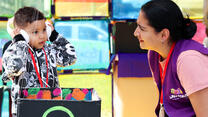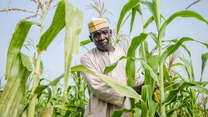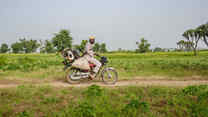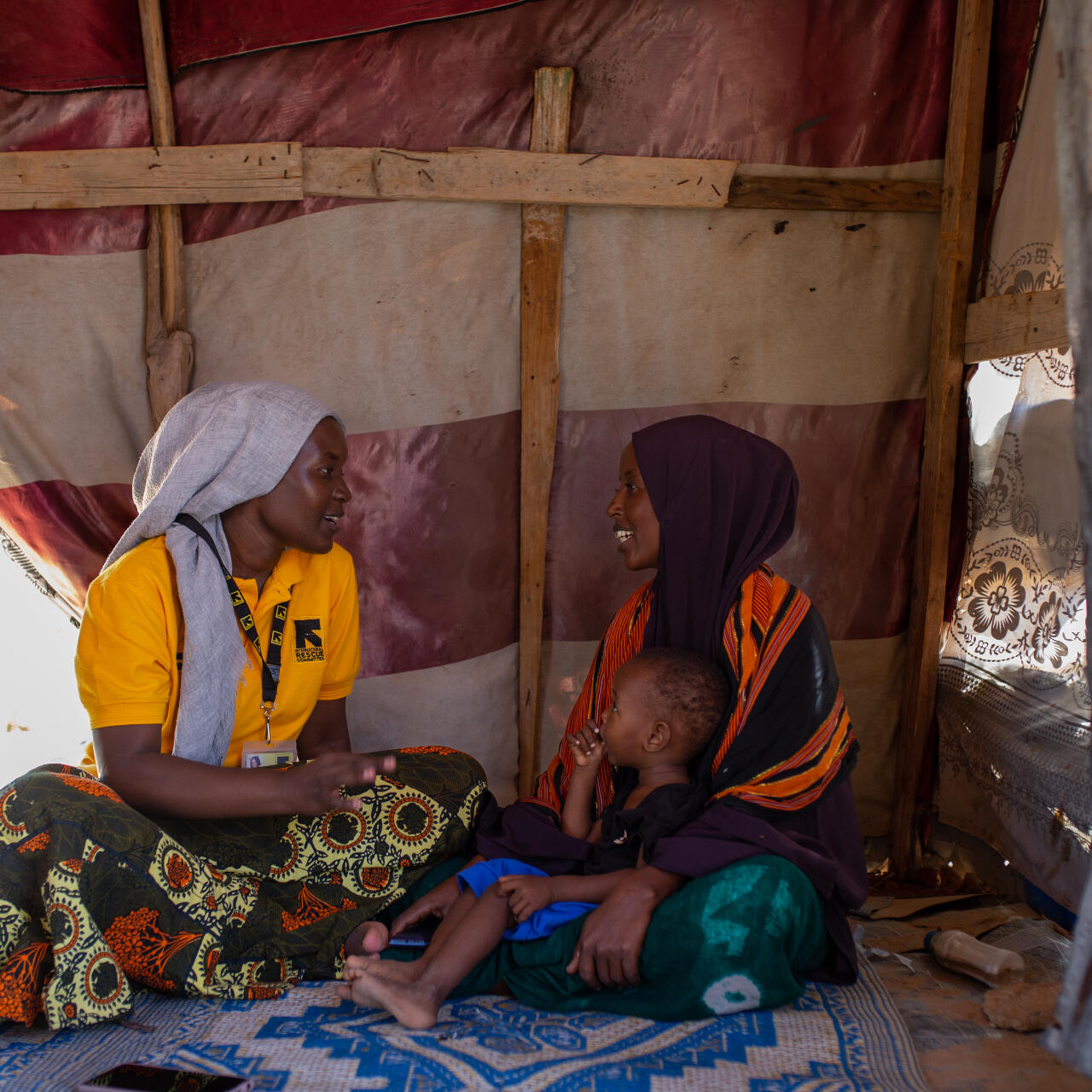
Over the last 90 years, the IRC has generated or partnered in the creation of more impact research in conflict zones than any other organization. With more people displaced than ever, the evolving and growing nature of the global refugee crisis requires not just more aid, but new thinking too.
The IRC offers partners powerful and unique opportunities to help rebuild the lives of people affected by conflict and disaster.
Our partnerships are defined by -
- Co-creation: We partner with some of the world's most innovative companies and philanthropies to design solutions for the world’s most challenging problems.
- Innovation: The IRC works with an in-house research & innovation team, the Airbel Impact Lab, to design, test and scale life-changing solutions to solve the biggest challenges facing crisis-affected communities around the world.
- Impact: The IRC is an international leader in humanitarian relief. We help rebuild the lives of millions of people with data-driven, cost-effective and scalable programs while fighting for a world where women and girls have an equal chance to succeed.
At the onset of its 90th anniversary, the IRC works in more than 40 crisis-affected countries and reached over 32.9 million people in 2022. Together, with the world’s leading corporations and philanthropies, we innovate and collaborate to help people affected by humanitarian crises to survive, recover and rebuild their lives.
Join us in celebrating some of our most innovative partnerships.
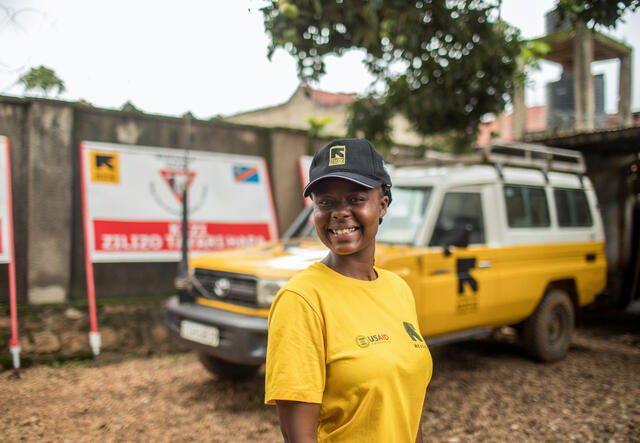
Pfizer Foundation: promoting integrated family planning and immunization in East Africa
Pfizer has been a longstanding supporter of the IRC's global humanitarian efforts. In recent years, The Pfizer Foundation* and the IRC embarked on a four-year project in 2016, aimed at promoting immunization and family planning in Uganda and Ethiopia. With support from The Pfizer Foundation and others, the IRC developed a mobile application, mReach, to help track immunizations among children of mothers receiving family planning and sexual and reproductive health services in Uganda. The app was also used in Somalia as part of a joint project between The Pfizer Foundation and Google, which helped ensure more than 4,500 children received the vaccinations they needed. The use of mReach has since been scaled up across IRC’s health programs, benefitting numerous communities.
*The Pfizer Foundation is a charitable organization established by Pfizer Inc. It is a separate legal entity from Pfizer Inc.
Bloomberg Foundation: celebrating three decades of collaboration
Bloomberg Philanthropies is a valued and committed partner that continues to build on their nearly 30 years of support for the International Rescue Committee (IRC). Their important investment flexibly supports the IRC’s most critical infrastructure, programming and lifesaving emergency response efforts around the world. They have also been a key supporter of our innovation, data and evidence generation, contributing to the sector-wide influence of IRC’s work.
Signpost: tech sector teams up to provide vital information to refugees
The Signpost project was launched in 2015 to support refugees who were fleeing to Europe. Signpost uses cutting-edge technology to connect crisis-affected people with vital resources, such as health or legal services, through the support of partners like the Breakthrough Prize Foundation, Cisco, Google.org, Meta, Microsoft, Avanade, Schmidt Futures, TripAdvisor Foundation and Zendesk. In 2022, 4.09 million people engaged with Signpost products directly and over 21 million individuals encountered Signpost content online.
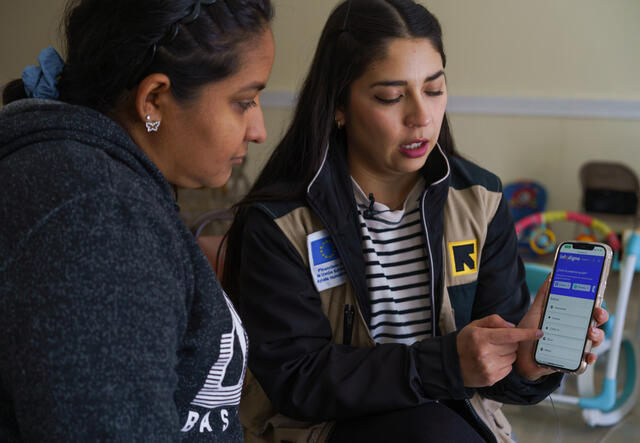
Dubai Cares: improving education for refugee children
Between 2016 and 2021, Dubai Cares collaborated with the IRC and NYU-Ties to develop the Education in Emergencies: Evidence for Action (3EA) program, reaching refugee children and teachers in Lebanon, Niger and Sierra Leone with life-changing education interventions. Research on the 3EA program indicates that the IRC’s Healing Classrooms model improves literacy and numeracy skills for children across conflict contexts while investments in their social and emotional learning improve their lives. It has also evidenced the importance of clear and ongoing professional development and support for teachers and other school officials in driving faithful program implementation and positive academic and SEL outcomes for students. Not only has 3EA brought learning services to children and educators in need, it has also prompted donors to increase their investment in social and emotional learning.
Citi Foundation: building Resilient Futures
Since 2017, Citi Foundation and the IRC have collaborated on the Resilient Futures program, which empowers young people to establish their own businesses or enter the job market. The program provides participants with business training, start-up grants, mentorship and networking opportunities. Resilient Futures has been implemented in Greece, Germany, Cameroon, Nigeria, Lebanon, Jordan and Mexico, and has supported over 6,000 young people since its launch. Given the significant number of refugees and internally displaced people residing in urban settings, the program emphasizes the importance of empowering displaced individuals as they rebuild their lives in cities worldwide. Resilient Futures fosters financial independence, community engagement and the development of business skills among participants.
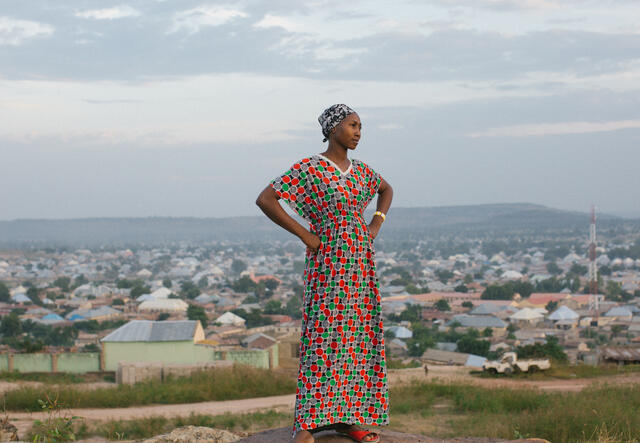
Uber: impact through transportation and emergency support
Uber has been a valuable partner to the IRC since 2017, providing transportation to clients through cash and Uber credit. They have also leveraged in-app fundraisers to contribute $4 million to the IRC’s Ukraine response and nearly $2 million to our Afghanistan response. In 2023, Uber committed $1.5 million over three years to meet IRC client and staff transportation needs. This support will assist our clients on their journey to stability and self-sufficiency, helping them overcome the substantial obstacle of transportation access as they rebuild their lives.
Sesame Workshop: helping children learn, grow and thrive in conflict regions
The IRC has partnered with Sesame Workshop, the organization behind Sesame Street, to develop the Ahlan Simsim initiative – the largest childhood intervention in the history of humanitarian response. Since 2017, Ahlan Simsim has combined the IRC’s expertise with Sesame Workshop’s educational media to deliver a life-changing initiative that provides children with the support they need to learn, grow and thrive. The initiative has reached over 1.6 million children and caregivers across Iraq, Jordan, Lebanon and Syria through in-person services and an Arabic-language version of “Sesame Street,” which introduces new puppet characters designed to help children manage emotions like fear and frustration while learning healthy coping strategies.
Ahlan Simsim was made possible by the John D. and Catherine T. MacArthur Foundation, which selected Sesame Workshop and the IRC’s initiative as the winner of the 2017 100&Change competition. We were awarded a $100 million grant to "make measurable progress toward solving a significant problem of our time." This encouraged further investment—$100 million just one year later from the LEGO Foundation.
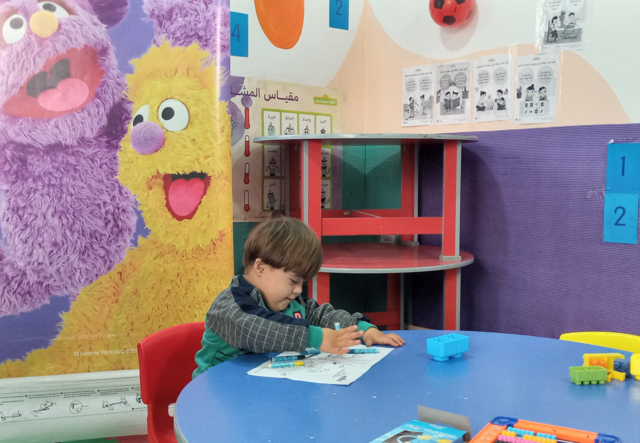
Johnson & Johnson Foundation: Improving people’s health in the Middle East
Between 2019 and 2022, Johnson & Johnson Foundation funded the IRC's efforts to support integrated community health workers in Jordan and reached more than 15,400 households with health services. With that support, we adapted to the COVID-19 lockdowns and developed a remote service delivery plan, which allowed clients to continue to receive critical services. As pandemic restrictions eased, we maintained a hybrid approach and transitioned the project to a local partner to implement and manage in 2023.
Dr. Christina Kirby and Mr. Joshua Kulkin: addressing the child malnutrition crisis
Over 50 million children suffer from acute malnutrition every year and 80% of them don’t have access to treatment. This will only continue to worsen as conflict and violence overtake countries in need.
With a 2019 investment from Dr. Christina Kirby and Mr. Joshua Kulkin, the IRC developed a game-changing approach to combat acute malnutrition that simplifies the treatment process and brings treatment straight to the children in their homes and communities. We call these ‘simplified approaches’ to treatment. Through rigorous research supported by Dr. Kirby and Mr. Kulkin, we showed that the simplified approaches are as clinically effective and more cost-efficient than the current standard of care. With their continued support, the IRC is advancing breakthrough solutions that reduce the gap in access to treatment and achieve better outcomes for the millions of children suffering from acute malnutrition.
LEGO Foundation: promoting learning through play in East Africa
In East Africa, the LEGO Foundation, the IRC and other partners have collaborated since 2020 to deliver play-based learning opportunities that enhance children’s cognitive, social, emotional, physical and creative skills — as well as their overall well-being — through the PlayMatters program. This initiative will benefit 800,000 young refugee and host community children in Uganda, Ethiopia and Tanzania by incorporating play in education. Play creates a positive and inclusive environment where children can explore, experiment and develop critical life skills, mitigating the impact of conflict, disaster or displacement.
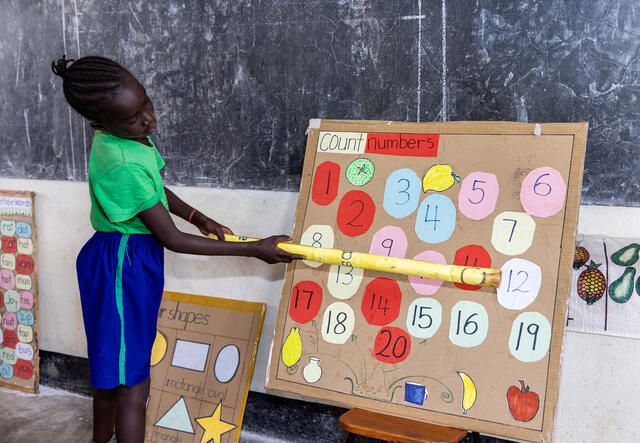
Educate A Child: Increasing access to education in Northeast Nigeria
Following successful partnership initiatives in the Democratic Republic of the Congo and Côte d’Ivoire, which enabled more than 92,000 children to access primary education, the Education Above All Foundation’s Educate A Child (EAC) program and the IRC teamed up again in 2020 to address the education gap in conflict-affected areas in Northeast Nigeria. This partnership provided educational opportunities for over 20,000 children at the primary level, and their communities, by combining accelerated learning, economic development through income-generation activities and emergency preparedness approaches.
The project exceeded expectations by helping to enroll 21,000 out-of-school children and 9,600 children who had dropped out, into school. It also built or rehabilitated 29 learning structures and financially empowered vulnerable families to sustain their children's education.
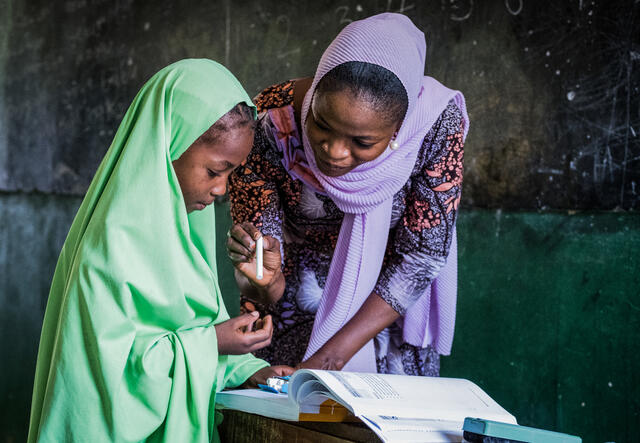
Sandberg Goldberg Bernthal Charitable Fund: empowering women and supporting innovation
As COVID-19 spread across the globe, gender-based violence experts and women’s rights activists expressed concerns about the safety of women and girls who were stuck at home with their abusers and unable to access essential health services. With multi-year support from the Sandberg Goldberg Bernthal Charitable Fund beginning in 2020, the IRC provided healthcare, economic services and special protection for over 6,000 women and girls in Jordan, including refugees seeking safety in the country. The Sandberg Goldberg Bernthal Charitable Fund continues to have a life-changing impact on vulnerable people around the world via its support of the IRC’s Airbel Impact Lab.
IKEA Foundation: helping refugees Re:Build
In 2021, the IKEA Foundation and the IRC partnered to form the Refugees in East Africa: Boosting Urban Innovations for Livelihoods Development (Re:Build) initiative. This five-year and €30 million partnership aims to support 20,000 individuals in Nairobi, Kenya and Kampala, Uganda, with livelihood support such as business skills training, apprenticeships, grants and access to financial services. Through this work, Re:Build generates evidence for innovative livelihood solutions, which can be adopted in other cities in East Africa and beyond. The program also advocates for policies that support financial inclusion and engage local businesses to incorporate refugee livelihoods into their plans.
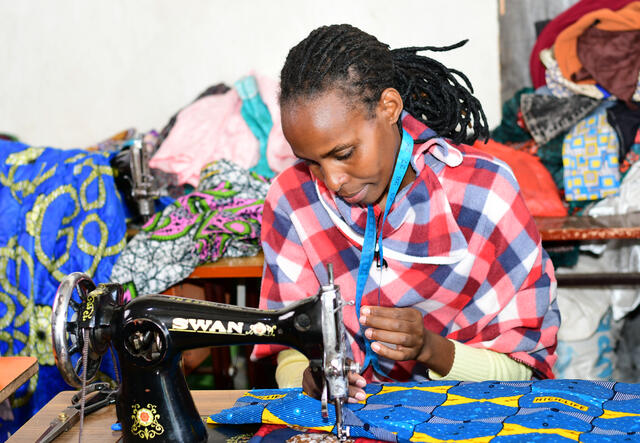
Thompson Family Foundation: scaling effective malnutrition treatments
The current system behind malnutrition treatment is complex, costly and leaves a vast majority of children in need without treatment. Today, malnutrition contributes to nearly 1 million child deaths annually. In 2021, the Thompson Family Foundation responded by investing in the IRC’s research developing innovative solutions that simplify the treatment protocol for acute malnutrition and make diagnosis and treatment accessible at the community level. The IRC has successfully used this treatment protocol to achieve a remarkable 85-95% recovery rate and 21% cost savings compared to the standard treatment.
With ongoing support from the Thompson Family Foundation, the IRC is scaling these innovative solutions and leading an ambitious advocacy strategy, enabling us to collaborate with local governments and partner organizations in expanding implementation of the breakthrough treatment. Together, we are advancing the infrastructure that will deliver malnutrition treatment to millions of children where the IRC operates and beyond.
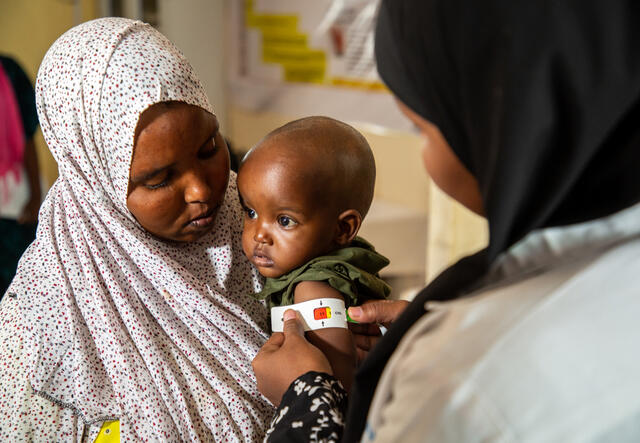
Google.org: advancing climate adaptation research
Google supported the IRC’s 2021 Anticipatory Action project in Nigeria, which was conducted in collaboration with the International Food Policy Research Institute (IFPRI). This project evaluated the use of early warning systems and anticipatory cash as a means of mitigating the impacts of disaster, promoting food security and building resilience to climate shocks in agricultural regions of Northeastern Nigeria. The results of this project are promising and have inspired the IRC to consider using anticipatory action to advance climate programming and research to meet humanitarian needs in other vulnerable communities. In addition to supporting the Anticipatory Action project, Google has provided the IRC with over $22 million, staff time and technical expertise in support of our humanitarian programs around the world.
Conrad N. Hilton Foundation: empowering young children and their families in Uganda
The Conrad N. Hilton Foundation’s 2022 commitment of $10 million enabled the IRC and four local partners to implement a three-year project aimed at improving early childhood development and transforming livelihood opportunities for refugees and host communities in Uganda. The project, called ‘Kulea Watoto’ — meaning ‘nurturing children’ in Swahili — will support young children through early childhood learning opportunities, and their caregivers through economic programming aimed at helping them provide for their families.
Stellar Development Foundation: delivering cash to Ukrainians in need
In late 2022, the Stellar Development Foundation (SDF) and IRC partnered to pilot the first-of-its-kind blockchain-enabled Stellar Aid Assist platform to deliver cash assistance in the form of stabilized digital dollars, backed by fully reserved assets, to the IRC’s clients in Ukraine. This innovative and revolutionary cash aid delivery mechanism was used within the IRC’s existing multipurpose cash assistance program, alongside other cash delivery mechanisms to provide an important form of humanitarian support to Ukrainians affected by war.
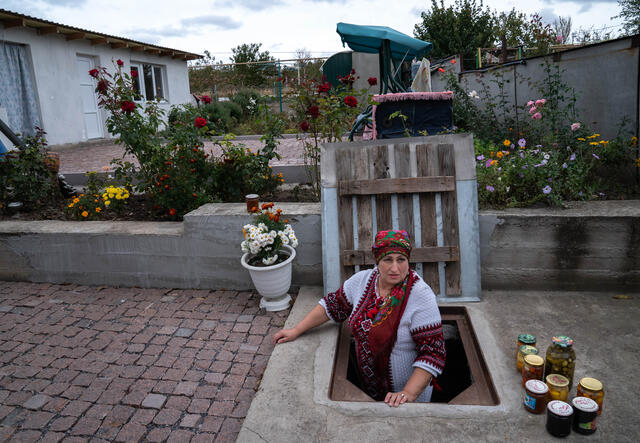
*Last name excluded for privacy
